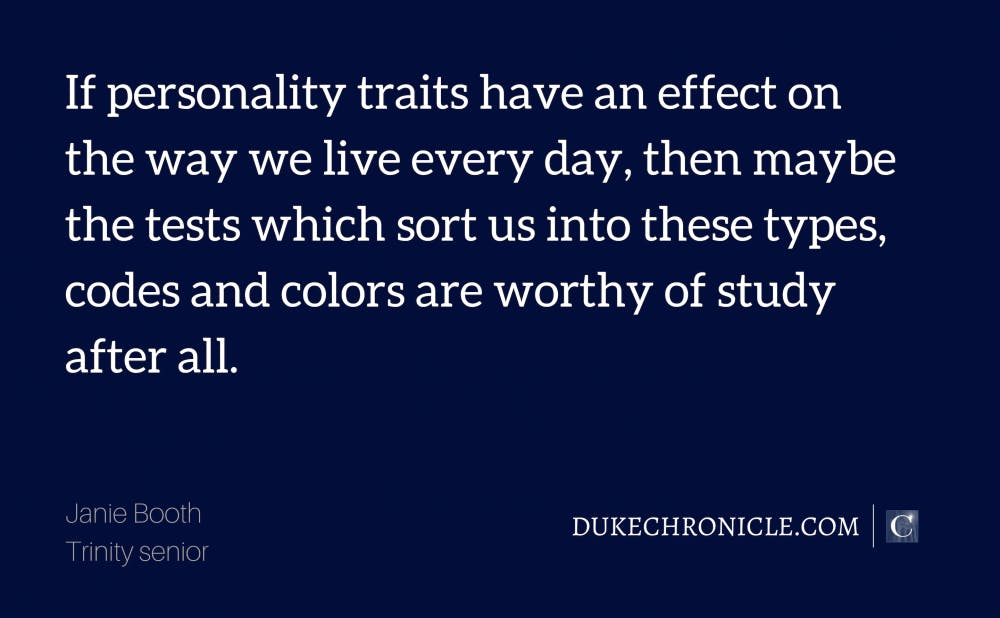“Are you the shy one or the talkative one?”
I grew up being one half of a pair. My twin sister and I were a package deal, ready for double dutch, double dates and double the trouble. We were two peas in a pod with four left feet.
Even though our family and friends could tell us apart, strangers could not, and as a result, I have walked through life with a blurrier sense of where my own identity ends and hers begins. So we are left to define ourselves by our personalities: the funny one and the serious one, the headstrong sister and the shy sister.
There seem to be a million and one ways to quantify the ways in which humans interact with each other and the world. The Myers Briggs test sorts us into sixteen categories each with a different lettered ‘code’. The Enneagram assigns us each a number, one through nine, and focuses on how yours interacts with adjacent and opposite numbers when arranged in a circle. Believers in astrology sort people according to their date of birth and rely on planetary alignments in order to draw conclusions about their personalities and predict life events. Some people decipher personality traits through reading the energy surrounding one’s body, called an aura, and assign it a color which changes depending on emotion.
So if I told you I am a Gemini, Enneagram 2, ENFP, and my aura is bright yellow with a hint of violet, what would you really know about me? Just a bunch of adjectives grouped together, like compassionate, kind, extroverted and cheerful, which are meant to sum up my existence.
These categories have always struck me as arbitrary, but there’s an entire field of study based on it: the cult of personality testing. I don’t know if there is a Myers Briggs code for someone who is skeptical of personality tests, but I have a feeling it might be H O A X.
Personality traits can predict life outcomes, according to a study conducted by Dr. Avshalom Caspi, a Duke professor of neuroscience and psychology. Caspi tested how personality traits predicted divorce, mortality and occupational attainment.
The study reported that even when factors of socioeconomic background and intelligence were taken into account, personality traits did have an effect in predicting levels of occupational attainment. Translation: personalities have power.
Extroverts were more likely to assume roles in leadership; people who are more conscientious may prefer jobs such as accounting or farming. The study also indicated that when people find jobs which align with their personalities, they will perform better in those jobs, which should lead to greater success and happiness across their lives. The diagnostic tests I’ve had to complete in professional settings might be helpful than I once thought.
If personality traits have an effect on the way we live every day, then maybe the tests which sort us into these types, codes and colors are worthy of study after all. Personality tests give us the language to talk about the differences between ourselves and others in a relatively value-neutral way. And, regardless of if it works or not, the act of deciphering personality traits is fun. There’s something intoxicating about recognizing little parts of yourself in other people: aligning our idiosyncrasies, strengths and fears in order to situate ourselves in a larger narrative.
Growing up as part of a pair meant our personalities could complement each other when we needed it most. Her easygoing calmness meant I could be a tornado of chaos, and my willingness to speak meant she didn’t ever have to answer the phone or order from a menu at a restaurant. In some ways, what has been the hardest part of experiencing college in separate places is how we've had to grow on our own without each other to fill in the gaps.
This is what makes measuring personalities so challenging: they change. Over time our shyness turns into confidence and our chaos transforms into wisdom. People are more complicated than the boxes personality tests places us in because those boxes only can measure who we are at one particular moment, not the sum of our childhoods and inside jokes and embarrassing moments and dreams for the future.
Joan Didion once wrote, “We tell ourselves stories in order to live.” Perhaps our personalities are the punctuation we use to we write those stories with. One thing I know for sure, though, is that a sum of adjectives will never be able to tell the whole story.
Janie Booth is a Trinity senior. Her column usually runs on alternate Tuesdays.
Get The Chronicle straight to your inbox
Sign up for our weekly newsletter. Cancel at any time.

